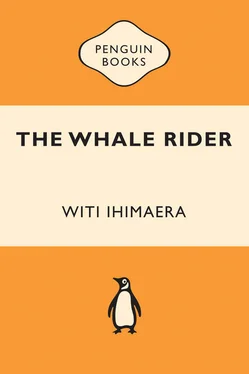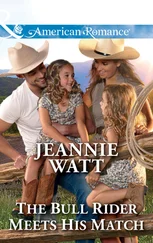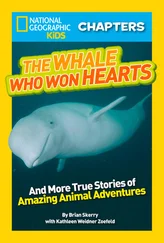Eight years ago I was sixteen. I’m twenty-four now. The boys and I still kick around and, although some of my girlfriends have tried hard to tempt me away from it, my first love is still my BSA. Once a bikie always a bikie. Looking back, I can truthfully say that Kahu was never forgotten by me and the boys. After all, we were the ones who brought her birth cord back to Whangara, and only we and Nanny Flowers knew where it was buried. We were Kahu’s guardians; whenever I was near the place of her birth cord, I would feel a little tug at my motorbike jacket and hear a voice saying, ‘Hey Uncle Rawiri, don’t forget me.’ I told Nanny Flowers about it once and her eyes glistened. ‘Even though Kahu is a long way from us she’s letting us know that she’s thinking of us. One of these days she’ll come back.’
As it happened, Porourangi went up to get her and bring her back for a holiday the following summer. At that time he had returned from the South Island to live in Whangara and work in the city. Koro Apirana was secretly pleased with this arrangement because he had been wanting to pass on his knowledge to Porourangi. One of these days my eldest brother will be the big chief. All of a sudden, during a cultural practice in the meeting house, Porourangi looked up at our ancestor Paikea and said to Koro Apirana, ‘I am feeling very lonely for my daughter.’ Koro Apirana didn’t say a word, probably hoping that Porourangi would forget his loneliness. Nanny Flowers, however, as quick as a flash, said, ‘Oh you poor thing. You better go up and bring her back for a nice holiday with her grandfather.’ We knew she was having a sly dig at Koro Apirana. We could also tell that she was lonely too for the grandchild who was so far flung away from her.
On Kahu’s part, when she first met Koro Apirana, it must have been love at first sight because she dribbled all over him. Porourangi had walked through the door with his daughter and Nanny Flowers, cross-eyed with joy, had grabbed Kahu for a great big hug. Then, before he could say ‘No’ she put Kahu in Koro Apirana’s arms.
‘Oh no,’ Koro Apirana said.
‘A little dribbling never hurt anybody,’ Nanny Flowers scoffed.
‘That’s not the end I’m worried about,’ he grumbled, lifting up Kahu’s blankets. We had to laugh, because Kahu had dribbled at that end too.
Looking back, I have to say that that first family reunion with Kahu was filled with warmth and love. It was surprising how closely Kahu and Koro Apirana resembled each other. She was bald like he was and she didn’t have any teeth either. The only difference was that she loved him but he didn’t love her. He gave her back to Nanny Flowers and she started to cry, reaching for him. But he turned away and walked out of the house.
‘Never mind, Kahu,’ Nanny Flowers crooned. ‘He’ll come around.’ The trouble was, though, that he never did.
I suppose there were many reasons for Koro Apirana’s attitude. For one thing, both he and Nanny Flowers were in their seventies and, although Nanny Flowers still loved grandchildren, Koro Apirana was probably tired of them. For another, he was the big chief of the tribe and was perhaps more preoccupied with the many serious issues facing the survival of the Maori people and our land. But most of all, he had not wanted an eldest girl-child in Kahu’s generation; he had wanted an eldest boy-child, somebody more appropriate to teach the traditions of the village to. We didn’t know it at the time, but he had already begun to look in other families for such a boy-child.
Kahu didn’t know this either, so of course, her love for him remained steadfast. Whenever she saw him she would try to sit up and to dribble some more to attract his attention.
‘That kid’s hungry,’ Koro Apirana would say.
‘Yeah,’ Nanny Flowers would turn to us, ‘she’s hungry for him , the old paka. Hungry for his love. Come to think of it, I must get a divorce and find a young husband.’ She and all of us would try to win Kahu over to us but, no, the object of her affection remained a bald man with no teeth.
At that time there was still nothing about Kahu which struck us as out of place. But then two small events occurred. The first was when we discovered that Kahu adored the Maori food. Nanny had given her a spoonful of fermented corn, and next minute Kahu had eaten the lot. ‘This kid’s a throwback,’ Nanny Flowers said. ‘She doesn’t like milk or hot drinks, only cold water. She doesn’t like sugar, only Maori food.’
The second event happened one night when Koro Apirana was having a tribal meeting at the house. He had asked all the men to be there, including me and the boys. We crowded into the sitting room and after prayer and a welcome speech, he got down to business. He said he wanted to begin a regular instruction period for the men so that we would be able to learn our history and our customs. Just the men, he added, because men were sacred. Of course the instruction wouldn’t be like in the old days, not as strict, but the purpose would be the same: to keep the Maori language going, and the strength of the tribe. It was important, he said, for us to be so taught. The lessons would be held in the meeting house and would begin the following week.
Naturally we all agreed. Then, in the relaxed atmosphere that always occurs after a serious discussion, Koro Apirana told us of his own instruction years ago under the guidance of a priest. One story followed another, and we were all enthralled because the instruction had mainly taken the form of tests or challenges which he had to pass: tests of memory, as in remembering long lines of genealogy; tests of dexterity, wisdom, physical and psychological strength. Among them had been a dive into deep water to retrieve a carved stone dropped there by the priest.
‘There were so many tests,’ said Koro Apirana, ‘and some of them I did not understand. But I do know the old man had the power to talk to the beasts and creatures of the sea. Alas, we have lost that power now. Finally, near the end of my training, he took me into his hut. He put out his foot and pointing to the big toe, said “Bite.” So I did, and —’
Suddenly, Koro Apirana broke off. A look of disbelief spread over his face. Trembling, he peered under the table, and so did we. Kahu was there. Somehow she had managed to crawl unobserved into the room. Koro Apirana’s toes must have looked juicy to her because there she was, biting on his big toe and making small snarling sounds as she played with it, like a puppy with a bone. Then she looked up at him, and her eyes seemed to say, ‘Don’t think you’re leaving me out of this.’
We were laughing when we told Nanny Flowers.
‘I don’t know what’s so funny,’ she said sarcastically, ‘Kahu could have gotten poisoned. But good on her to take a bite at the old man. Pity she doesn’t have any teeth.’
Koro Apirana, however, was not so amused and now I understand why.
Seven

The next time Kahu came to us she was two years old. She came with Porourangi, who had a lovely woman called Ana with him. It looked like they were in love. But Nanny Flowers had eyes only for Kahu.
‘Thank goodness,’ Nanny Flowers said after she had embraced Kahu, ‘you’ve grown some hair.’
Kahu giggled. She had turned into a bright button-eyed little girl with shining skin. She wanted to know where her grandfather was.
‘The old paka,’ said Nanny Flowers. ‘He’s been in Wellington on Maori Council business. But he comes back on the bus tonight. We’ll go and pick him up.’
We had to smile, really, because Kahu was so eager to see Koro Apirana. She wriggled and squirmed all the way into town. We bought her a soft drink but she didn’t want it, preferring water instead. Then, when the bus arrived and Koro Apirana stepped off with other Council officials, she ran at him with a loud, infectious joy in her voice. I guess we should have expected it, but it was still a surprise to hear her greeting to him. For his part, he stood there thunderstruck, looking for somewhere to hide.
Читать дальше













